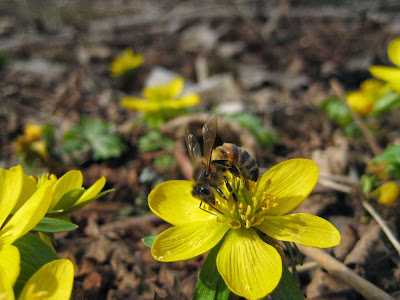This is it! :) The perfect time to plant all sorts of bee friendly bulb flowers, shrubs, trees and even flower seeds.
Bulb Flowers: Snowdrops, Eranthis, Anemones, Siberian Squill, Daffodils are a few bees adore.
 |
| Snow drops bloom very early, end of February and beginning of March |
 |
| Eranthis is another early bloomer |
 |
| Siberian Squill starts flowering after the Snowdrops |
 |
| Daffodil is another early spring flower |
I will be stratifying Quince seeds in pots outdoor since they need to be in cold to be able to sprout in spring time.
Many self seeding flowers can also be planted now.
At this time of invasive mono-crop agriculture it is of alerting importance to plant bee friendly plants as much as we are able to. Lawns are useless unless covered in Clower. It is best to create large flower islands on a large lawn. This also means less need to mow the lawn = less petrol needed to feed the grass cutting machines.

I've just added Snow Drops and Eranthis to my growing list of "bulbs for the bees." I planted the Siberian Squill today wondering if 50 bulbs would be enough. I might have to beef up the numbers when I find a place to order online. Many thanks for mentioning these.
ReplyDeleteHiya,
ReplyDeleteI am really enjoying your blog.
Now daffodils--that's the only one I don't think is really supporting bees unless you know of a variety that is attractive to them. I think some of these bulbs were once attractive to bees in their wild form, but they have been bred so that they are attractive to humans, but not so much for bees--ie the tulip.
What a post! All beautiful flowers and plants. flowering plants Crocus plants are relatively small, reaching just 3-6 inches in height (depending on the variety). The leaves are grass-like, generally with a light stripe running up the middle. Many of the spring-flowering crocus bulbs are among the earliest bloomers. The blooms pucker up at night and re-open in the morning.
ReplyDeleteThis rare, fall blooming crocus is more commonly called the Saffron Bulb or Saffron Crocus! It begins blooming in September and continues through October! The purple flowers have deep purple veining! It's orange-red stigmas are the source of saffron, the worlds most expensive spice! Plant in full sun or partial shade and well-drained soil. It grows 3-5in. tall. Hardy in Zones 5-9. In cooler regions the Saffron Crocus can be grown in containers. You can harvest the saffron when the flowers are blooming. Hirt's is one of the few companies that offer this rare bulb to the gardening public.
This rare, fall blooming farinaceous plant is a lot of unremarkable referred to as the Saffron Bulb or Saffron Crocus! It begins blooming in September and continues through October! The purple flowers have deep purple veining! It's orange-red stigmas at the supply of saffron, the worlds most costly spice! Plant fully sun or partial shade and well-drained soil. It grows 3-5in. tall. Hardy in Zones 5-9. In cooler regions the saffron is adult in containers. you'll be able to harvest the saffron once the flowers at blooming. Hit's is one amongst the few firms that supply this rare bulb to the husbandry public.
ReplyDeleteWedding Flowers